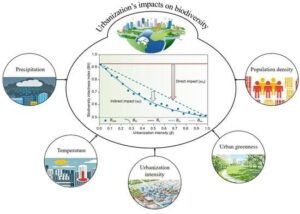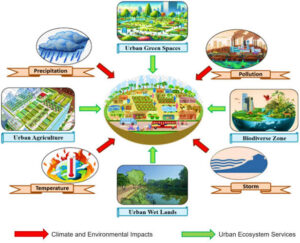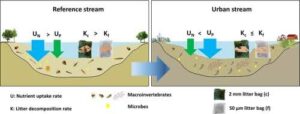Back to: Environmental Biology 100 Level
Welcome to class!
Hello champion learner! Today, we will discuss Urbanisation & Ecosystem Stress, an important topic that shows how the rapid growth of cities can put pressure on our natural environment. Nigeria is one of the fastest urbanising countries in Africa, with cities like Lagos, Abuja, and Port Harcourt growing rapidly. By the end of this lesson, you will understand what urbanisation is, how it affects ecosystems, and what can be done to reduce the stress on the environment.
Urbanization & Ecosystem Stress
Have you noticed how small towns transform into busy cities filled with cars, buildings, and factories? This process is called urbanisation. While urbanisation brings development and opportunities, it also creates environmental problems such as air pollution, flooding, and loss of natural habitats for animals.

What is Urbanisation?
Urbanisation is the increase in the number of people living in towns and cities, often leading to the expansion of roads, houses, industries, and other infrastructure.
Causes of Urbanisation
Rural to Urban Migration: People moving from villages to cities in search of jobs, education, and better living standards.
Industrial Growth: Establishment of factories and industries that attract workers.

Improved Infrastructure: Development of roads, schools, and hospitals makes cities attractive.
Population Growth: More people naturally leads to more urban areas.
What is Ecosystem Stress?
Ecosystem stress occurs when the environment cannot cope with the demands placed on it by human activities, leading to problems like pollution, deforestation, and habitat destruction.
Effects of Urbanisation on Ecosystems
Deforestation: Trees are cut down to make space for buildings and roads.
Air and Water Pollution: Increased vehicles and factories release harmful gases and dump waste into rivers.
Loss of Wildlife: Animals lose their natural habitats as cities expand.
Flooding: Poor waste management and construction on waterways cause flooding in urban areas.
Climate Change Contribution: More cars, industries, and energy use release greenhouse gases that increase global warming.
Ways to Reduce Ecosystem Stress in Urban Areas
Planting trees and creating green spaces in cities.

Recycling and reducing waste.
Using renewable energy like solar power instead of petrol generators.
Building proper drainage systems to prevent flooding.
Enforcing environmental laws to control pollution and protect wildlife.
Summary
- Urbanisation is the growth of towns and cities due to population increase and industrialisation.
- It causes ecosystem stress by destroying habitats, polluting air and water, and increasing flooding.
- Ecosystem stress happens when the environment is unable to handle human activities.
- Deforestation, pollution, and climate change are major effects of urbanisation.
- Planting trees, recycling, and using clean energy help reduce urban environmental problems.
Evaluation
- Define urbanisation in your own words.
- Mention two causes of urbanisation.
- Explain what ecosystem stress means.
- List three effects of urbanisation on the environment.
- Suggest two solutions for reducing ecosystem stress in cities.
Well done, star learner! You are now more aware of how the growth of our cities affects nature. Remember, small actions like planting a tree or avoiding littering can make a big difference in protecting our environment. Keep learning with Afrilearn—you are making Nigeria proud!
